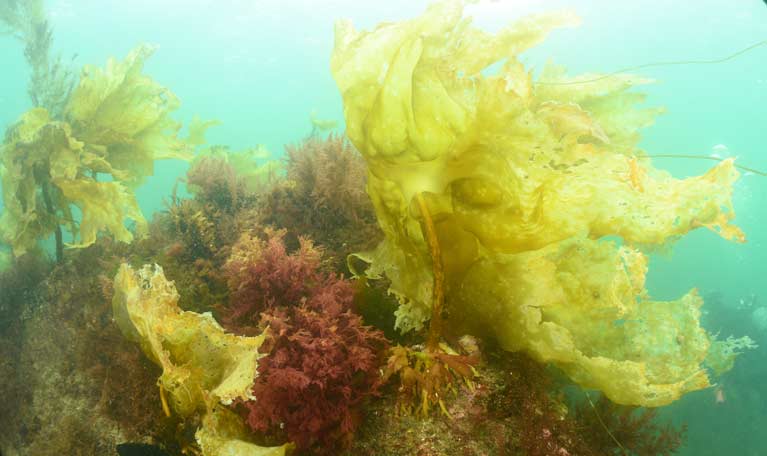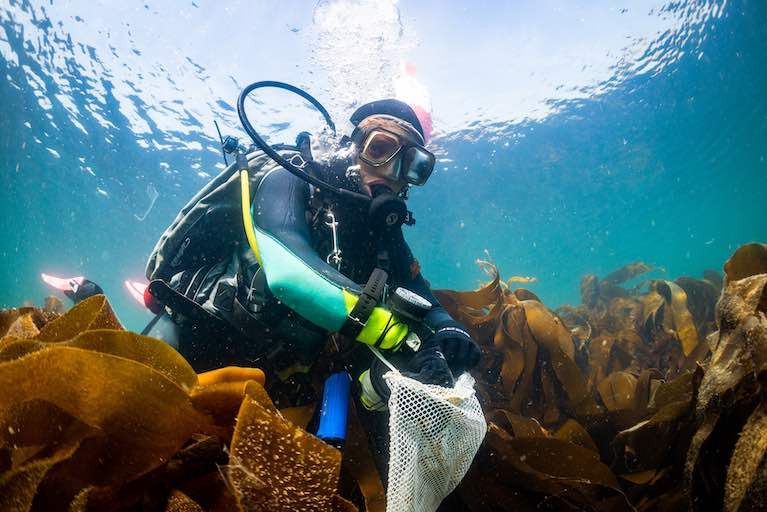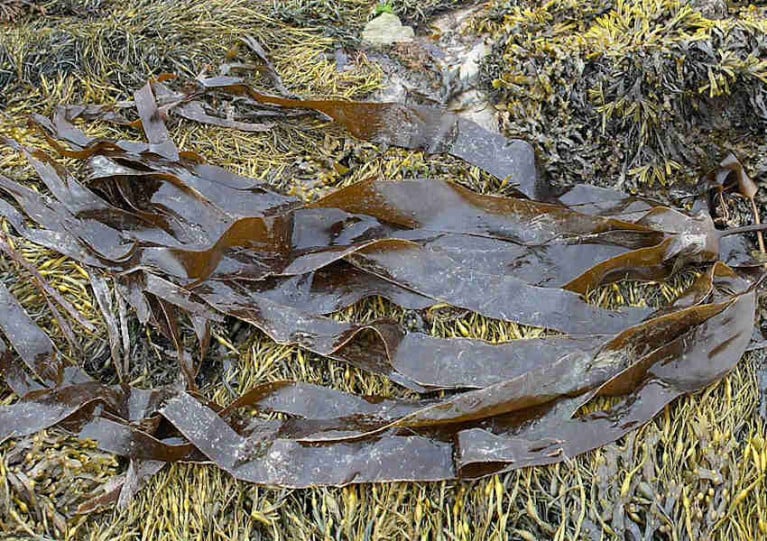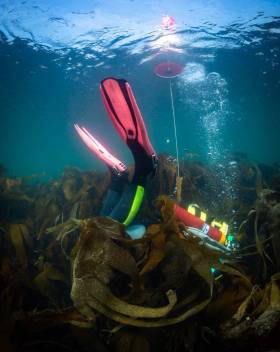Displaying items by tag: Kelp
A leading specialist in the ecology of Irish kelp forests along the Atlantic coastline has been given an award by the Irish Research Council (IRC).
NUI Galway marine ecologist Dr Kathryn Schoenrock has been given Early Career Researcher of the Year award.
Dr Schoenrock is a post-doctoral researcher who has led an intensive monitoring effort in kelp forests over the past three years, which is the first of its kind.
The IRC says her “ground-breaking work in this field has made her the authoritative voice on Irish kelp forest ecology, and the productivity and biodiversity of these systems in nearshore waters”.
Dr Schoenrock reported the first discovery of golden kelp in Irish waters last year. The small population was discovered in Scots Port cove on the north-west facing Belmullet coastline in Co Mayo.
Scots Port is located 1,040km from the nearest golden kelp population in Britain, and 1,630km away from the nearest population in France.
The dominant kelp species found in Irish waters is Cuvie (Laminaria Hyperborea), and five main types of kelp provide important habitats for marine life.
Kelp forest habitats are recognised as an important primary resource for terrestrial and marine organisms.
“ Recently they have been highlighted as an important blue carbon repository that may buffer climate change impacts to marine habitats by sequestering the increasing concentrations of carbon dioxide in our atmosphere,”the IRC notes.
There has been recent industry interest in, and environmental concern about, harvesting the native subtidal kelp, Laminaria Hyperborea.
Dr Schoenrock says she hopes her work will “inform academic studies, conservation planning, and industry ventures in the future”.
She says her work has led to international collaborations, laying the foundation for current research funding with the EPA, and she contributes data from Irish coastlines to national, European and international kelp forest monitoring networks.
She specialises in studying species response to climate change, ecophysiology of primary producers (seaweeds), chemical and marine ecology, and population and environmental genetics of marine seaweeds.
Her use of scientific diving in my research has supported development of a scientific diving dive-control board at NUIG, where she is dive officer, and taught the first Irish scientific (not technical) diving course there in spring-summer 2020.
‘Ice Age’ Kelp Off Ireland Could Be Key To Learning How Marine Plants Survive Climate Change
Kelp found on the coast of Ireland may have survived some 16,000 years since the last ice age, scientists have discovered — and it could be crucial to understanding how marine plants deal with climate change long-term.
According to AOL News, the team from universities in Scotland, France and Portugal studied the genetic composition of a type of kelp known as oarweed from 14 sites in the North Atlantic and found three distinct clusters — one along North America’s Eastern Seaboard, one off Ireland and Scotland, and another around Brittany.
“As the ice sheets retreated from northern European shorelines at the end of the most recent ice age, oarweed distribution followed and recolonised the higher latitudes of the Atlantic,” said marine ecologist Dr Andrew Watt from Heriot-Watt University.
As a result, the oarweed found in Ireland and Scotland today, many millennia later, is “more closely related to populations in the high Arctic than to the Brittany cluster”.
Despite their unique characteristics, it’s hoped the genetic similarity between the three clusters can help marine science experts learn how plant life can bridge such extremes of climate change.
AOL News has more on the story HERE.
Citizen science pinpointed the first samples of a rare kelp in Irish waters, and now NUI Galway researchers are hoping that sea swimmers, divers and kayakers may help to find more writes Lorna Siggins
Samples of golden kelp (Laminaria ochroleuca), which is normally found in France, Spain and Britain, were identified for the first time almost a year ago in north Mayo.
The small population was discovered in Scots Port cove on the north-west facing Belmullet coastline, and recognised by Dr Kathryn Schoenrock of NUI Galway’s (NUIG) Ryan Institute.
The dominant kelp species found in Irish waters is Cuvie (Laminaria Hyperborea), and five main types of kelp provide important habitats for marine life.
 Photo of sample of golden kelp found for first time last year in Irish waters in north Mayo - NUI Galway researchers appealing to citizen scientists to help locate more examples. Photo: Dr Kathryn Schoenrock, NUI Galway
Photo of sample of golden kelp found for first time last year in Irish waters in north Mayo - NUI Galway researchers appealing to citizen scientists to help locate more examples. Photo: Dr Kathryn Schoenrock, NUI Galway
“Golden kelp, which harbours less biodiversity, is a really important species in Spain and Portugal,” Dr Schoenrock explained.
“We would have expected to find the first samples here on Ireland’s south-east coast, given the proximity to Britain, France and Spain,” she says.
Scots Port is located 1,040 kilometres away from the nearest golden kelp population in Britain, and 1,630 kilometres away from the nearest population in France.
Genetic analyses would suggest that the Co Mayo population is more diverse than the British, resembling the richness described for populations in the Iberian peninsula, Dr Schoenrock said.
“The fact that it was found in a small enclosed cove in north Mayo may be a result of a Portuguese or Spanish vessel sheltering nearby,” she says.
“However, it can drift long distances and it could be more prevalent than we know.”
The samples found by citizen science participants in a Searsearch Ireland and Porcupine survey trip were collected by Dr Stacy A Krueger-Hadfield for genetic analysis at the University of Alabama at Birmingham in North America.
The discovery was the subject of a study which had recently been published in the scientific journal, Marine Biodiversity Records.
Dr Schoenrock said that citizen science initiatives like Seasearch Ireland and Coastwatch are an “excellent way to involve local communities that have a vested interest in the health of these ecosystems”.
“In conjunction with existing research bodies like the Environmental Protection Agency (EPA), National Parks and Wildlife Services, and the Marine Institute, we need more programmes that can sustain long term ecological research of shallow marine systems over many years,” she said.
Seasearch Ireland national co-ordinator Tony O’Callaghan said that its participants had collected over 50,000 records of over 1,000 species.
He said the data set is “the best continuous record collected since the last major state-funded study of Ireland’s inshore marine environment, the Biomar survey, which was in the 90s.”
This project is funded under the EPA Research Programme 2014-2020.
Given that golden kelp has much lower biodiversity than native kelp forests, it is more suitable kelp to harvest, Dr Schoenrock noted.
“It can grow to a larger size and it doesn’t dominate habitats yet in Ireland,” she said.
State approval in November 2017 of a license to harvest native kelp by mechanical means in Bantry Bay has aroused opposition on environmental grounds in West Cork and resulted in ongoing litigation.































































